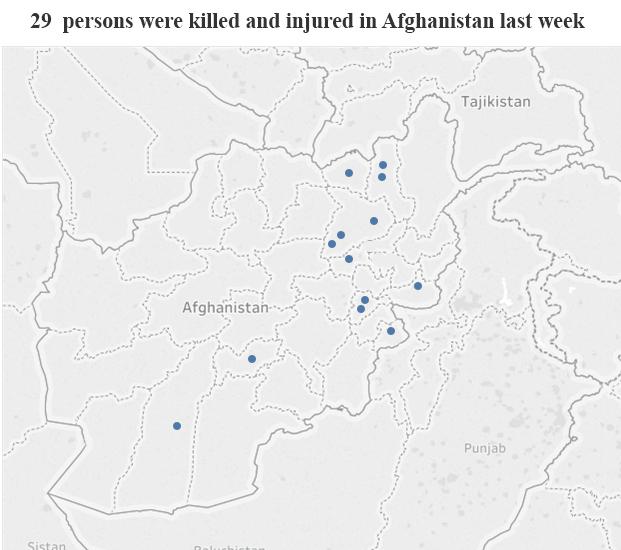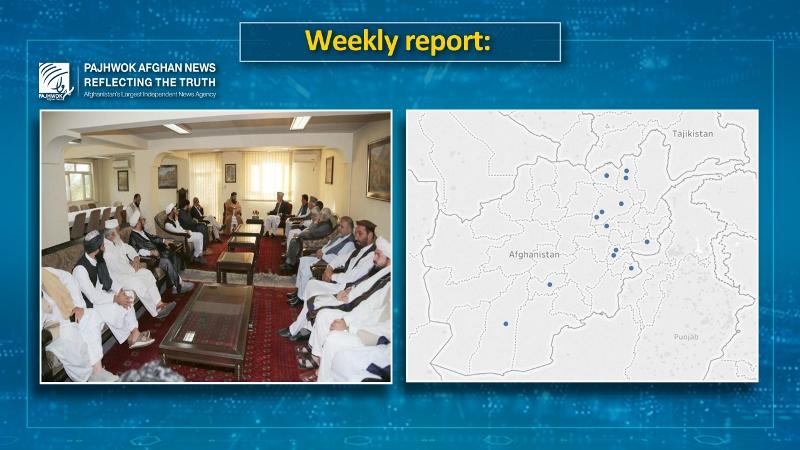KABUL (Pajhwok): Former ambassadors of Canada and Australia in Afghanistan have called on their countries to reopen embassies in Kabul and interact with the war-torn country.
Islamic Emirate officials say they adhere to neutral politics and some international officials have urged the resumption of girls’ education.
Last week’s major events:
- Ex-Canadian envoy: Time to open embassy in Kabul, interact with IEA
- Ex-Australian ambassador says interaction with IEA key to supporting Afghans
- Maulvil Kabir: World has realized IEA achievements
- Hanafi: IEA adhered to neutral politics, wants positive interaction
- People awaited breakthrough in girls’ education saga
- Brown: World must take practical steps to give Afghan women rights
Maulvi Yaqub: No one should blame us for their security failures
Casualties
Last week, 14 people were killed and 15 others were injured in various incidents of violence including bomb blasts across the country.
Unidentified gunmen killed one person in Uruzgan, a former regional commander in Takhar, a Darul Hafaz manager in Kunduz, one person in Panjshir, one person in Kapisa and the body of a 40-year-old man turned up in Logar province.
A bomb blast in Khost killed three people and injured seven others. An explosion in Takhar injured two civilians. In Kunduz, a former manager of the anti-narcotics department was killed by his bodyguard.
One person was killed and three others were injured in a clash between two families in Helmand, one person was killed and his son was injured in a similar incident in Nangarhar and a shopkeeper stabled another after a verbal clash in Logar.

Note: These figures are based on reports reaching Pajhwok Afghan News. Some incidents may have gone unreported or sources provided incorrect figures.
In the previous week, nine people were killed and four others were injured in various incidents across the country.
Before the regime change in August 2021, hundreds of civilians, security forces and insurgents would get killed and wounded in violent incidents every week.
Interaction with caretaker government
Former Canadian ambassador to Afghanistan Arif Lalani has said he believes it’s time for diplomats to return to Kabul and deal with the Taliban.
“We never should have left,” Arif Lalani told CTV News. “Even if we don’t get much, certainly we’re better off being on the ground, seeing for ourselves and trying to moderate these extreme tendencies, than simply being on the sidelines outside of the country.”
Similarly, former Australian Ambassador Nicola Gordon-Smith also said that to support the people of Afghanistan and return girls to schools, it will be necessary to have some engagement with the Islamic Emirate of Afghanistan.
“They need support beyond simple humanitarian assistance – they need investment, essential services, and support for economic growth, in spite of their challenging conditions. In order to know what might be possible, including what could be the best way to see Afghan girls back in schools, it will be necessary to have some engagement with the Taliban,” Gordon-Smith said.
Islamic Emirate spokesman Zabihullah Mujahid has asked other countries to interact with the caretakers in order to build trust and solve existing problems.
“Relations with other nations are moving forward and have led to trust and some problems and indecisions that have prevented progress will be solved normally.”
Additionally, deputy foreign minister Maulvi Abdul Kabir told a big gathering in Kabul marking the independence day that the countries of the world had now realized the latest achievements in Afghanistan.
He said currently the embassies of 16 countries were open in Kabul.
Deputy prime minister Abdul Salam Hanafi said the Islamic Emirate pursued a policy of neutrality in Afghanistan and asked the world for positive interaction with the caretaker government.
Acting Foreign Minister Maulvi Amir Khan Muttaqi said those waiting for the situation in Afghanistan to deteriorate, their wish will not be fulfilled and the people of Afghanistan will soon witness a good interaction with the Islamic Emirate.
Abdul Salam Hanafi said: “You cannot clap with one hand, friends are made from both sides. We are doing this and we expect this from them, and we want robust interaction and healthy relations with neighboring, regional and international countries.”
Education of girls
UN Secretary-General Antonio Guterres has asked the international community not to forget the people of Afghanistan.
On his X handle, Guterres wrote: “It is now two years since the Taliban takeover of Afghanistan & the situation in the country remains deeply troubling.”
The UN chief referred to what he called the severe restrictions imposed on the rights of women and girls in Afghanistan.
He said the global fraternity must not forget Afghanistan’s people, currently faced with a difficult situation.
However, Islamic Emirate officials have always insisted they are committed to ensuring the rights of women and girls within the framework of Islamic law.
US Secretary of State Antony Blinken has said strengthening relations between the caretaker government of Afghanistan and the world is linked to respecting women’s rights in Afghanistan.
Gordon Brown, the special representative of the United Nations Organization for Global Education, asked the international community to work together for the rights of women and girls in Afghanistan.
The United Nations has launched a campaign for girls’ education in Afghanistan.
However, deputy foreign minister Sher Mohammad Abbas Stanakzai has said women’s rights are an internal matter of Afghanistan and have nothing to do with the US.
He asked the US to come to Afghanistan and participate in the reconstruction of the country.
However, Zabihullah Mujahid called the UN special representative’s statement a political propaganda, saying Afghan women’s rights were not related to the world.
Blame game
Acting defense minister Maulvi Mohammad Yaqub Mujahid has said no country should blame Afghans and the caretaker government for their failure to prevent security incidents on their own land.
Recently, various civil and military officials of Pakistan blamed Afghanistan for attacks and security incidents in the country, but Yaqub said: “We do not want enmity with anyone and have no intention to destroy anyone’s security. But they should also fulfill and recognize their responsibility and not blame Afghans for their failures.”
He also reminded that other countries should not encourage anyone to fight against the acting government.
Pakistani scholars in Kabul
An eight-member delegation of Pakistani religious scholars arrived in Kabul last week to hold talks with Afghan officials.
The head of the Pakistani delegation, Maulana Muhammad Tayyeb Qureshi said they wanted to improve relations between the two countries and resolve differences.
The delegation also met former president Hamid Karzai and discussed with him relations between the two countries and the existing threats to security and stability in the region.
ma







GET IN TOUCH
NEWSLETTER
SUGGEST A STORY
PAJHWOK MOBILE APP